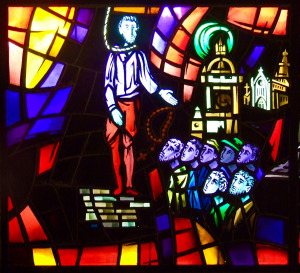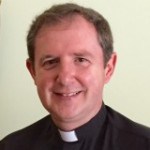30th November 2015
Celebrating St. Andrew, Scotland in Rome


The celebration of the Feast Day of the apostle St Andrew, brother of St Peter, is one of the high points in the Scots College year. It is an opportunity to invite many friends in the city, as well as some from home, to join the community in celebrating both the College and Scotland.
The Pontifical Scots College in Rome was founded in Jubilee year of 1600 by Pope Clement VIII three years before the Scottish King James VI succeeded to the throne of England. Its original purpose was to secure an education for Scottish boys and young men in piety and in the Christian religion. Some sixteen years later, on the anniversary of the martyrdom of the John Ogilvie, it became wholly dedicated to the education of priests when all its students took the Mission Oath.
The establishment of the College represented another stage in a long history that linked Scotland, Rome and the Holy See. Part of that history is told in the mosaics and stained glass of the current College building. St Ninian the first Christian missionary to Scotland and founder of the first Church at Whithorn was, tradition tells us, educated in Rome, just like our students today. In the midst of the struggles between England and Scotland, the Scottish king, bishops and nobles appealed to Pope John XXII to recognise their independence in the Declaration of Arbroath in 1320. Pope Alexander VI and Julius II gifted the sceptre and sword of the Honours of Scotland, the oldest regalia in the British Isles, in 1494 and 1507, respectively. These symbolic acts represented the religious and political bonds that had grown over the years and the presence in the city of Scottish pilgrims who were given shelter in the Scots Hospice in Rome.

In the course of the history of the College, it has witnessed, and at times been part of, the changing relationships between the Holy See and Scotland, Great Britain and the United Kingdom. Perhaps its most obvious significance was in its role during the Stuart exile in Rome. King James III and Pope Clement XI visited the College on the Feast of St Margaret in June 1717. Some former students of the College accompanied his son Charles Edward Stuart during the Jacobite Uprising of 1745. Charles’ brother Cardinal Henry Benedict was the Cardinal Protector and had a long association with the College.
The eventual repeal of the Penal Laws and the restoration of the Scottish Catholic Hierarchy 1878 led to a period of new relationships and the role of the College Rector as an agent for the Scottish Church in Rome with the Holy See. During that time some of the Rectors had very close contact with the Holy Father. As communication and travel improved this role diminished, but the number of seminarians and visitors increased.
Today the College continues to be a little bit of Scotland in Rome. As we approach the beginning of a new Holy Year and the 400th anniversary of the Mission Oath, the College looks forward to continuing its role as both a place of welcome for Scots in Rome and a reminder to the Church in Rome of the Church in Scotland founded by St Ninian and dedicated to St Andrew all those centuries ago.

Sirs,
The free thinking people of the world are coming to terms with the realization that Gods do not exist. That belief is from ancient times, there is no room in this modern and scientific world for religion of any description. More people on the planet have lost their lives through religious disagreement than any other cause.
It is time for an end to religious hostility with our fellow human beings.
The figment God was created by man for the purpose of controlling others. Manipulation and control has continued through the ages and is still being used.
By continuing to promote religion the people of our world will always be in conflict.
Please stop trying to give people false hope, their prayers are never answered and their desperations for help only give them short term comfort.
Saluti P. Daniel, che grande gioia sapere di vuoi, nel ricordo di St. Andrea.
As a descendant of Saint Margaret of Scotland and as my name is derived from the Greek name I share with Christ’s first Apostle, I send my sincere good wishes on the day of celebration for Scotland’s Patron Saint, Saint Andrew.